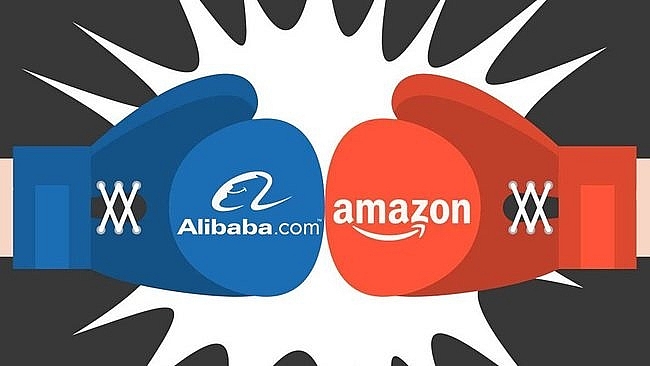Amazon and Alibaba to compete in Vietnam e-commerce’s ring
 |
| Amazon and Alibaba to compete in Vietnam e-commerce’s ring, source: Pinterest |
Amazon begun its foray into Vietnam by striking up a partnership with Vietnam Trade Promotion Agency (VIETRADE) under the Ministry of Industry and Trade to support Vietnamese businesses to boost exports via Amazon’s marketplaces.
Vietnam is the second fastest growing market in Southeast Asia (just behind Indonesia), according to a report by Google and Temasek, and already features Alibaba.
The Vietnamese e-commerce sector is worth about $2.8 billion, with an annual growth rate of 87 per cent.
Simon Baptist, global chief economist at The Economist Intelligence Unit, pointed out: “Vietnam has a young population proficient in technology who are making it a habit to buy goods online, with their rising income. In addition, Vietnam is trying to promote the non-cash economy with the goal of having 50 per cent of urban households use electronic payments for daily transactions by 2020,” according to newswire in plo.vn.
Vietnam is one of the fastest growing economies in the region and is expected to increase by 18 million middle-class households in 2017-2030, more than 30 per cent of whom will be living in Hanoi and Ho Chi Minh City.
However, before Amazon, Vietnam welcomed the Chinese tech giant Alibaba Group. In June 2017, this technology giant invested $1 billion in Lazada, increasing its holding to 83 per cent from 51 per cent and take its total outlay on the company so far to more than $2 billion.
Not long after that, Alibaba announced in March 2018 that it would invest an additional $2 billion in Lazada, two years after it acquired a controlling stake in the Singapore-headquartered e-commerce site.
According to Lazada, this firm has 155,000 sellers and serves about 560 million people in the region with more than 300 million products such as electronics, household items, and clothes among others.
Meanwhile, Alibaba’s main rival Tencent also penetrated the Vietnamese market and expanded its e-commerce and online payment services with the introduction of Shopee and Airpay.
Another popular name receiving investment from both domestic (VNG) and international (JD.com from China and STIC from Korea) enterprises is Tiki.
The only name which is wholly-owned by a Vietnamese corporation is Adayroi of Vingroup.
An interesting fact is that by the end of 2018, according to iprice.vn, Shopee and Tiki passed Lazada to rank first and second among the country's top 50 e-commerce players based on their average quarterly traffic, mobile application ranking, social media followers, and number of staff.
The newest entry, Amazon, is a leading company in the field of e-commerce, accounting for nearly 45 per cent in the US.
According to statistics from Website Builder Expert, Amazon is the most powerful cross-border e-commerce empire, covering 58 countries with 13 Amazon platforms for 13 regions, and having 1.2 billion visitors a year.
Alibaba ranks second in the globe, covering 15 countries, its activities focus on China and Southeast Asia, with 1.07 billion visitors.
Although Amazon has just dipped its toe in Vietnam, with its available financial resources, logistics, and technology, the Vietnamese market could very well be heading towards mirroring the global situation, with Amazon and Alibaba arm-wrestling while the rest look on.
To conquer the Vietnamese e-commerce market, each player has their own strategy. Last September, Amazon Global Selling Southeast Asia announced doubling efforts to support Vietnamese sellers, including the launch of the global selling website in Vietnamese and Amazon's official Vietnamese Facebook page to enable more Vietnamese sellers to easily access information, materials, and support to start selling on Amazon.
The race between Amazon and Alibaba in the Vietnamese e-commerce market will be dramatic and the winner remains a mystery for now, but what is certain is that consumers and vendors will see immense benefits. Imagine that someday Vietnam will have many items delivered by unmanned aerial vehicles (drones) and consumers will receive products in only a few hours of placing the order.
What the stars mean:
★ Poor ★ ★ Promising ★★★ Good ★★★★ Very good ★★★★★ Exceptional
 Tag:
Tag:
Related Contents
Latest News
More News
- VNPAY and NAPAS deepen cooperation on digital payments (February 11, 2026 | 18:21)
- Vietnam financial markets on the rise amid tailwinds (February 11, 2026 | 11:41)
- New tax incentives to benefit startups and SMEs (February 09, 2026 | 17:27)
- VIFC launches aviation finance hub to tap regional market growth (February 06, 2026 | 13:27)
- Vietnam records solid FDI performance in January (February 05, 2026 | 17:11)
- Manufacturing growth remains solid in early 2026 (February 02, 2026 | 15:28)
- EU and Vietnam elevate relations to a comprehensive strategic partnership (January 29, 2026 | 15:22)
- Vietnam to lead trade growth in ASEAN (January 29, 2026 | 15:08)
- Japanese business outlook in Vietnam turns more optimistic (January 28, 2026 | 09:54)
- Foreign leaders extend congratulations to Party General Secretary To Lam (January 25, 2026 | 10:01)



























 Mobile Version
Mobile Version